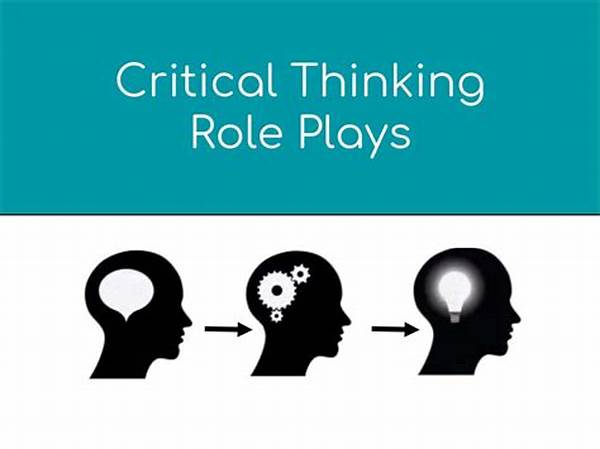Critical thinking is an essential skill in today’s complex world, enabling individuals to analyze information, solve problems, and make informed decisions. One effective pedagogical method to enhance this skill is role-playing. Role-playing for critical thinking involves participants assuming specific roles in simulated scenarios to explore various perspectives and develop analytical abilities. Its role in educational and professional settings has gained increasing recognition, showcasing its potential to nurture critical thinkers adept at navigating challenges.
Read Now : Pocket-friendly Online Workforce Education
Enhancing Critical Thinking Skills Through Role-Playing
Role-playing provides a dynamic platform where participants engage in interactive learning experiences. By stepping into different roles, individuals encounter diverse viewpoints, encouraging them to question assumptions and develop empathy. Role-playing for critical thinking fosters a deeper understanding of complex issues, as it compels participants to consider multiple aspects of a situation. This experiential approach bridges the gap between theoretical knowledge and practical application, enabling learners to apply critical thinking skills in real-world contexts. Furthermore, role-playing enhances communication skills, as participants articulate their perspectives and collaborate to solve problems. Consequently, role-playing not only cultivates critical thinking but also hones interpersonal and communication competencies essential in professional and personal environments.
Applications of Role-Playing in Critical Thinking Development
1. Educational Settings: In classrooms, role-playing for critical thinking allows students to explore historical events, literary works, or ethical dilemmas, increasing engagement and understanding.
2. Professional Training: Businesses use role-playing scenarios to train employees in problem-solving, conflict resolution, and decision-making, enhancing workplace efficiency.
3. Healthcare Simulations: Medical training programs incorporate role-playing to prepare practitioners for patient interactions, emphasizing critical thinking in diagnosis and treatment.
4. Conflict Resolution: Role-playing techniques teach negotiation and mediation skills, fostering critical thinking to address conflicts constructively.
5. Cross-Cultural Understanding: Engaging in role-playing scenarios involving diverse cultural contexts develops critical thinking by challenging stereotypes and promoting cultural sensitivity.
Role-Playing as a Tool for Critical Thinking in Education
Role-playing for critical thinking is an invaluable tool, particularly in educational contexts. By immersing students in role-playing activities, educators create a participatory learning environment where students actively engage with the subject matter. Such interactive experiences enhance students’ ability to evaluate information critically, synthesize diverse viewpoints, and anticipate potential outcomes. Furthermore, the collaborative nature of role-playing encourages teamwork, where participants learn to respect opposing opinions, thereby fostering an appreciation for diversity. This method cultivates a classroom culture that values critical inquiry and reflective thinking, equipping students with skills crucial for lifelong learning and adaptability in an ever-changing world.
Benefits of Role-Playing for Critical Thinking
1. Interactive Learning: Encourages active involvement in the learning process, increasing retention and comprehension of complex concepts.
2. Perspective-Taking: By assuming diverse roles, participants learn to appreciate different perspectives, promoting empathy and reducing biases.
3. Problem-Solving Skills: Encourages creative and analytical thinking, essential for devising innovative solutions.
4. Communication Enhancement: Develops participants’ ability to articulate thoughts clearly and effectively in various settings.
5. Confidence Building: Provides a safe environment to practice skills and enhances self-assurance in public speaking and decision-making.
Read Now : Cross-industry Collaborative Innovation Platforms
6. Empathy Development: Fosters understanding by allowing participants to experience situations from the viewpoints of others.
7. Collaboration: Promotes teamwork and cooperation, essential elements in professional and personal success.
8. Real-World Application: Bridges the gap between theoretical knowledge and practical implementation.
9. Creative Expression: Offers an outlet for imaginative and inventive thinking.
10. Cultural Sensitivity: Enhances awareness and appreciation for cultural differences.
11. Strategic Thinking: Cultivates the ability to anticipate outcomes and plan accordingly.
12. Self-Reflection: Encourages introspection and evaluation of one’s beliefs and assumptions.
Implementing Role-Playing for Critical Thinking in the Workplace
The integration of role-playing for critical thinking in the workplace presents numerous advantages. By simulating real-life scenarios, organizations can prepare employees to face complex challenges with resilience and adaptability. Through role-playing exercises, employees hone their ability to identify critical issues, weigh alternative solutions, and execute decisions with confidence. This method also aligns with professional development goals, as it fosters leadership skills, enhances emotional intelligence, and encourages innovative thinking. As businesses navigate a rapidly evolving landscape, role-playing for critical thinking emerges as a strategic tool to cultivate a forward-thinking and adaptive workforce, capable of thriving in diverse environments.
A Summary of Role-Playing for Critical Thinking
In conclusion, role-playing for critical thinking stands as a transformative educational and professional tool. Its ability to immerse participants in experiential learning experiences fosters a holistic development of analytical and interpersonal skills. By instilling a deep sense of empathy and diverse perspective-taking, role-playing encourages open-mindedness and reduces cognitive biases. As participants navigate various scenarios, they become adept at synthesizing information, evaluating alternatives, and making informed decisions. This experiential learning approach not only enhances cognitive skills but also enriches personal growth, equipping individuals to face complex societal challenges with competence and confidence. Furthermore, the collaborative nature of role-playing strengthens team dynamics, fostering a culture of cooperation and mutual understanding. This approach empowers individuals and organizations to harness the power of critical thinking, ensuring preparedness for the uncertainties of the future. In essence, role-playing for critical thinking is a vital paradigm for shaping inquisitive, empathetic, and adaptable thinkers ready to contribute to an increasingly interconnected world.
